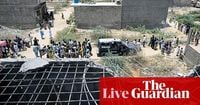In a significant escalation of military tensions between India and Pakistan, the Indian government has launched Operation Sindoor, a series of precision strikes targeting terrorist infrastructure across the border. This operation comes in response to the Pahalgam terror attack on April 22, which claimed the lives of 26 civilians, primarily Indian tourists. The attack has been directly linked to inflammatory remarks made by Pakistan Army Chief General Asim Munir, who described Kashmir as Pakistan's "jugular vein" and encouraged a narrative of division between Hindus and Muslims.
On Thursday, May 8, 2025, during a media briefing on Operation Sindoor, Indian Foreign Secretary Vikram Misri condemned Pakistan for granting state funerals to terrorists, questioning the morality of such actions. He stated, "As far as we are concerned, the individuals eliminated at these facilities were terrorists. Giving terrorists state funerals may be a practice in Pakistan." Misri's remarks were part of a broader denunciation of Pakistan's handling of terrorism, which he described as a deliberate misrepresentation to the international community.
The day began with Indian forces neutralizing an air defense system in Lahore, following a series of attempted strikes by Pakistan on multiple Indian cities, including Srinagar and Jammu. The Indian Defense Ministry reported that these attempts were thwarted by its air defense systems, which successfully intercepted drones and missiles. Wing Commander Vyomika Singh confirmed that the Indian military had targeted Pakistani radars and defense systems, stating, "We have responded to Pakistan’s escalation with equal intensity."
Defense Minister Rajnath Singh, addressing an all-party meeting later that day, reported that at least 100 terrorists had been killed in the strikes under Operation Sindoor. He praised the operation for its precision and minimal collateral damage, emphasizing that no civilian lives were lost in the process. Singh remarked, "The precision with which Operation Sindoor was executed is unimaginable and very praiseworthy. Nine terrorist camps were destroyed, and a large number of terrorists were killed."
Following the operation, India directed all over-the-top (OTT) media platforms operating within its jurisdiction to cease streaming any content originating from Pakistan. This directive reflects the heightened national security concerns following the recent violence. The Ministry of Information and Broadcasting stated that this action was necessary in light of ongoing terrorist activities linked to Pakistan-based groups.
In a related development, the Indian government convened an all-party meeting to brief political leaders about the military action. Participants included Union Ministers and opposition leaders, who expressed unanimous support for the government's stance against terrorism. Congress MP Gurjeet Singh Aujla noted, "The Army has been called here. We have to cooperate with the Army and the Administration."
Amid these tensions, Pakistan's military has accused India of launching drone strikes on its territory, claiming that Indian drones have targeted cities such as Karachi and Lahore. Pakistani Defense Minister Khawaja Asif warned that retaliation is "increasingly certain," indicating a potential escalation in hostilities. He stated, "The situation has become very difficult. We have to respond."
On the ground, the situation remains volatile. Reports indicate that shelling along the Line of Control (LoC) has intensified, resulting in casualties among civilians. The External Affairs Ministry confirmed that at least 13 civilians were killed and 59 injured due to ceasefire violations by Pakistan in the Poonch district. Misri emphasized that Pakistan's actions were impacting innocent lives, stating, "Any further action by Pakistan is nothing but escalation and is being responded to effectively."
In a further sign of the escalating conflict, schools and colleges in several districts of Jammu and Kashmir have been closed as a precautionary measure. The government has also suspended flights at 27 airports across northern India until May 10, citing security concerns. The situation has led to a nationwide blackout drill as part of a civil defense exercise, underscoring the seriousness of the threat perceived by Indian authorities.
International responses to the conflict have varied. The United Nations General Assembly President Philemon Yang has called for maximum restraint from both nations, urging dialogue to resolve differences. Meanwhile, the U.S. has been involved in diplomatic efforts to de-escalate the situation, although Khawaja Asif indicated that the prospects for peace were dwindling.
As the situation continues to unfold, the Indian government remains firm in its stance against terrorism, asserting that any military action taken is a direct response to Pakistan's provocations. Misri reiterated that India's actions were not intended to escalate the conflict but were necessary to protect national security. He stated, "India’s intention has not been to escalate matters, and we are only responding to the original escalation by Pakistan in Pahalgam."
The ongoing conflict highlights the fragile nature of peace in the region, with both nations poised at the brink of further military engagement. As tensions rise, the international community watches closely, hoping for a resolution that avoids further loss of life.


